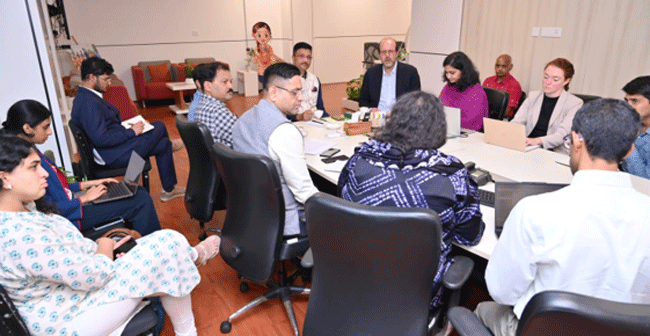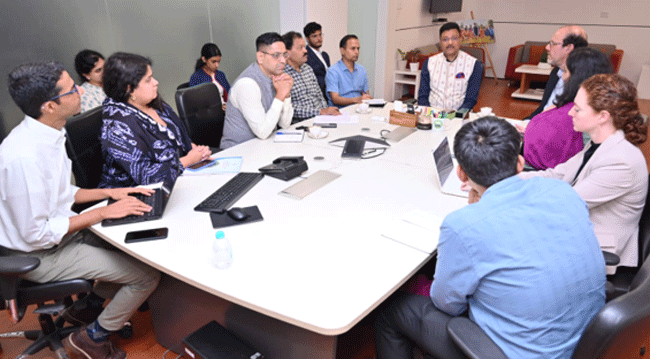Bhubaneswar: In a significant visit aimed at enhancing agricultural resilience, Nobel Laureate Prof. Michael Kremer and a 12-member team from the University of Chicago visited Krushi Bhavan to discuss their research on weather forecast dissemination systems and their effectiveness among the state’s farming community.
The meeting, chaired by Dr. Arabinda Kumar Padhee, Principal Secretary of the Agriculture and Farmers’ Empowerment Department, highlighted the potential for a new era of data-driven farming in Odisha.
During the discussion, Prof. Kremer expressed his deep appreciation for the department’s flagship Krushi Samrudhi Helpline (KSH). He noted that the helpline’s impressive outreach is successfully helping last-mile farmers protect their crops from climate-related adversities.
Looking ahead, Prof. Kremer offered a key suggestion for the department: the introduction of Artificial Intelligence (AI)-based forecasting. He proposed that by leveraging data on rainfall, temperature, and humidity, the system could better predict pest incidence, thereby empowering farmers to adopt crucial precautionary and preventive measures.

“Integrating multiple weather forecasting models with the existing KSH system is the need of the hour,” Prof. Kremer emphasized, pointing to a future where technology and traditional knowledge work in tandem to secure food production.
In response, Dr. Padhee, Principal Secretary Agriculture and Farmers’ Empowerment provided an overview of the department’s comprehensive and holistic approaches to agriculture. He highlighted initiatives such as the Comprehensive Rice Fallow Management for soil enrichment, crop insurance, customized agro-advisories, and the Krushak Odisha database.
Dr. Padhee also mentioned the digital pest monitoring system and the contingency plan developed in collaboration with OUAT, which serves as a vital tool for mitigating the adverse consequences of weather aberrations.
Prof. Kremer lauded these initiatives, recognizing the state’s proactive efforts in climate-resilient farming. The meeting concluded with a mutual understanding and a shared vision for a “meaningful partnership” between the University of Chicago and the state’s Agriculture Department, aimed at a mutual sharing of knowledge and expertise.
The high-profile meeting was also attended by key departmental officials, including Shri Shubham Saxena, Director of Agriculture and Food Production; Shri Subrat Kumar Panda, Director of Soil Conservation and Watershed Development; the Additional Secretary; senior officers; scientists from OUAT; and members of the Climate Resilience Cell (CRC).


